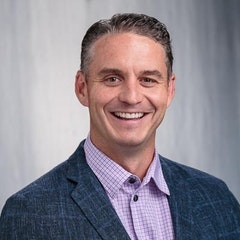This article is part of Carrier Management’s series on the Future of Insurance.
 Russell Johnston, CEO, QBE North America
Russell Johnston, CEO, QBE North AmericaQ: What major changes do you see on the horizon for the property/casualty insurance industry in the next 10 years? What will insurance companies, insurance leaders, the industry and its workforce look like in the next decade? What risks will they insure?
Johnston (QBE NA): The power of technology to drive change and disrupt traditional industry models will continue to have a paradoxical effect on the industry. It will give us more tools to collect and analyze data to price certain risks, but it will also accelerate the pace of change and give rise to unknown risks. Who would have thought several years ago that a cyber event could potentially equal the losses from a major hurricane? Businesses will need help to manage these “unknown unknowns,” yet insurers will be challenged to assume risks that historical methods of calculating risk and return won’t reliably evaluate.
Insurers will need to continue to evolve the means and methods that they use to assess and assume risk at the same time the risks will continue to evolve, but I have faith that we will do just that. One hundred years ago, with the advent of mass production of the automobile and spread of in-home electricity, there was limited accessible data to support how these changes in the risk landscape would impact the industry—but the industry adapted. I am optimistic we can do the same today, but it will require thinking differently.
To match the pace of change, specialized teams will need to be more fluid, and nimbly assembling partnerships will allow companies to constantly adjust the optimal mix of technical experts and industry specialists tailored to the needs of each customer. The historical norm of outright ownership of all products and services will have to evolve to a more flexible approach to solution-based outcomes. As collaboration and skills-tracking technology improve, the options for assembling these teams will become less about location and more about having the right skills and experience for each client situation at a specific time…
Read more Future Insights by person
 Mike Albert, Co-Founder, Ask Kodiak
Mike Albert, Co-Founder, Ask Kodiak Tim Attia, CEO and Co-Founder, Slice Labs, Inc.
Tim Attia, CEO and Co-Founder, Slice Labs, Inc. Arun Balakrishnan, CEO, Xceedance
Arun Balakrishnan, CEO, Xceedance Ilya Bodner, CEO, Bold Penguin
Ilya Bodner, CEO, Bold Penguin Bobby Bowden, Executive Vice President, Chief Distribution and Marketing Officer, Allied World
Bobby Bowden, Executive Vice President, Chief Distribution and Marketing Officer, Allied World Andy Breen, Senior Vice President, Digital, Argo Group
Andy Breen, Senior Vice President, Digital, Argo Group Adam Cassady, CEO, Tyche Risk
Adam Cassady, CEO, Tyche Risk Chris Cheatham, CEO, RiskGenius
Chris Cheatham, CEO, RiskGenius Trent Cooksley, Head of Open Innovation, Markel Corporation
Trent Cooksley, Head of Open Innovation, Markel Corporation Mike Foley, CEO, Zurich North America
Mike Foley, CEO, Zurich North America Guy Goldstein, Co-Founder and CEO, Next Insurance
Guy Goldstein, Co-Founder and CEO, Next Insurance Mike Greene, CEO & Co-Founder, Hi Marley
Mike Greene, CEO & Co-Founder, Hi Marley Brian Hemesath, Managing Director, Global Insurance Accelerator
Brian Hemesath, Managing Director, Global Insurance Accelerator Russell Johnston, CEO, QBE North America
Russell Johnston, CEO, QBE North America Dr. Henna Karna, Managing Director and Chief Data Officer, XL Catlin
Dr. Henna Karna, Managing Director and Chief Data Officer, XL Catlin Tony Kuczinski, President and CEO of Munich Re, US
Tony Kuczinski, President and CEO of Munich Re, US Rashmi Melgiri, Co-Founder, CoverWallet
Rashmi Melgiri, Co-Founder, CoverWallet David W. Miles, Co-Founder and Managing Partner, ManchesterStory Group
David W. Miles, Co-Founder and Managing Partner, ManchesterStory Group Pranav Pasricha, CEO, Intellect SEEC
Pranav Pasricha, CEO, Intellect SEEC Mike Pritula, President, RMS
Mike Pritula, President, RMS Kathleen Reardon, CEO, Hamilton Re
Kathleen Reardon, CEO, Hamilton Re Jeff Richardson, Senior Vice President, OneBeacon Insurance Group
Jeff Richardson, Senior Vice President, OneBeacon Insurance Group Vikram Sidhu, Partner, Clyde & Co
Vikram Sidhu, Partner, Clyde & Co Christopher Swift, CEO, The Hartford
Christopher Swift, CEO, The Hartford Rebecca Wheeling Purcell, Schedule It
Rebecca Wheeling Purcell, Schedule It Keith Wolfe, President US P/C—Regional and National, Swiss Re
Keith Wolfe, President US P/C—Regional and National, Swiss Re
The industry’s historical orientation around product will need to evolve to a more solutions-based approach.

Get the responses of all 26 leaders neatly packaged in single PDF download. More than 43 pages of content.




















 State Farm Mutual to Pay $5B Dividend to Auto Insurance Customers
State Farm Mutual to Pay $5B Dividend to Auto Insurance Customers  New Texas Law Requires Insurers Provide Reason for Declining or Canceling Policies
New Texas Law Requires Insurers Provide Reason for Declining or Canceling Policies  Telematics and Trust: How Usage-Based Insurance Is Transforming Auto Coverage
Telematics and Trust: How Usage-Based Insurance Is Transforming Auto Coverage  State Farm Inked $1.5B Underwriting Profit for 2025; HO Loss Persists
State Farm Inked $1.5B Underwriting Profit for 2025; HO Loss Persists 






